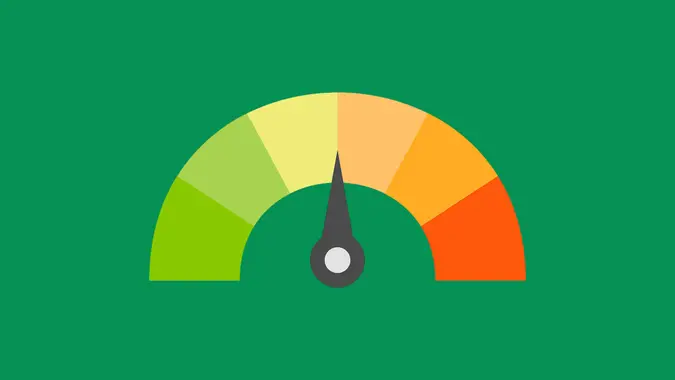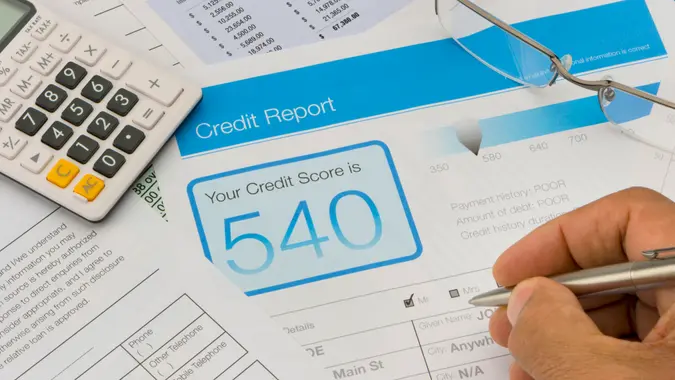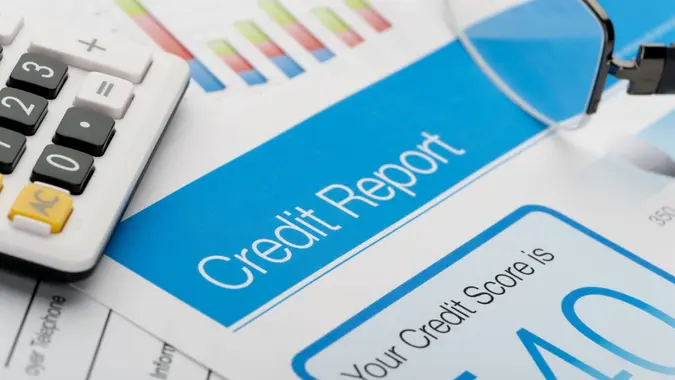What Is the Fair Credit Reporting Act (FCRA)? How This Law Protects Your Credit

Commitment to Our Readers
GOBankingRates' editorial team is committed to bringing you unbiased reviews and information. We use data-driven methodologies to evaluate financial products and services - our reviews and ratings are not influenced by advertisers. You can read more about our editorial guidelines and our products and services review methodology.

20 Years
Helping You Live Richer

Reviewed
by Experts

Trusted by
Millions of Readers
The Fair Credit Reporting Act is a federal law that went into effect in 1970. Its main job is to make sure your personal credit information is handled fairly and accurately by credit bureaus, lenders, employers and landlords.
In simpler terms, the FCRA gives you important rights, like:
- Checking your credit report for free every year from Equifax, Experian and TransUnion
- Disputing mistakes and having them corrected within 30 days
- Knowing who views your credit report and why
- Controlling how your credit information is shared with others
Basically, the FCRA makes sure your personal credit details aren’t misused or misrepresented, giving you power over your financial information.
Why Was the Fair Credit Reporting Act Created?
Before the FCRA was established, there weren’t many guidelines for how your credit data was collected, used or shared. This led to big problems — like incorrect credit reports or lenders unfairly rejecting people without giving a reason.
The FCRA stepped in to:
- Make sure your credit information stays accurate
- Provide an easy way for you to fix errors
- Keep your credit details private and secure
Now, because of the FCRA, you have clear protections and a reliable way to set things right if something goes wrong.
What Exactly Does the FCRA Cover?
The FCRA isn’t just about your credit score or reports from the three major bureaus. It covers a wide range of businesses, including:
- Credit reporting bureaus like Equifax, Experian and TransUnion
- Financial institutions like banks, credit card companies and loan providers
- Companies conducting background checks, including landlords and potential employers
- Specialized consumer reporting agencies collect rental history, employment details, and other background info
In short, if a company touches your financial or credit-related information, it falls under the umbrella of the FCRA.
Your Rights Under the Fair Credit Reporting Act
One of the most empowering parts of the FCRA is the specific rights it guarantees. Here’s exactly what the law says you can do:
- Request a free annual credit report from each of the three major credit bureaus
- Get notified if information in your credit report causes a denial for credit, insurance or employment
- Dispute and correct inaccuracies on your credit report promptly
- See who has looked at your credit report within the past two years
- Place fraud alerts on your report if you think you’re a victim of identity theft
These rights help you maintain accuracy in your credit history and quickly react if something goes wrong.
How to Use the FCRA to Keep Your Credit Safe
Now that you know your rights, here’s how you can put them into action effectively:
1. Regularly Check Your Credit Reports
Visit the official site, AnnualCreditReport.com, and download your reports. Reviewing them regularly helps you catch errors early and avoid unpleasant surprises later.
2. File a Dispute if You Find Errors
If something looks incorrect, like a payment marked late when it was on time, you can file a dispute directly with the bureau online or via mail. They must investigate and respond within 30 days.
3. Request Reports After a Denial
If you’re denied a loan, job, or apartment due to your credit report, the company must tell you exactly why. You’re entitled to request a free copy of the credit report they used, giving you a chance to spot and fix any errors.
4. Quickly Set Up Fraud Alerts
If you suspect identity theft, set up a fraud alert immediately. This requires lenders to verify your identity thoroughly before issuing credit in your name.
By taking these simple steps, you actively use the FCRA to safeguard your credit.
What Happens If a Company Violates the FCRA?
Thankfully, most companies follow the rules. But if your FCRA rights are ever violated, there are clear consequences, including:
- Financial penalties and fines issued by federal agencies
- Legal action and potential compensation if you’re harmed financially or emotionally
If you believe a violation occurred, you can:
- File a formal complaint with the Consumer Financial Protection Bureau (CFPB).
- Contact a consumer rights attorney who specializes in credit law for professional advice.
Having these options ensures that you’re never stuck without recourse if something unfair happens to your credit information.
How the FCRA Compares With Other Consumer Protection Laws
While the FCRA specifically protects your credit and personal financial data, other important laws strengthen consumer rights in similar areas:
- Fair Debt Collection Practices Act (FDCPA): Protects you from harassment by debt collectors.
- Equal Credit Opportunity Act (ECOA): Ensures lenders cannot discriminate based on race, gender, age or marital status when granting credit.
Together, these laws form a comprehensive safety net, helping you stay in control of your financial life.
The Bottom Line
Understanding exactly what the Fair Credit Reporting Act is helps you take control of your financial future. Here are the key points to remember:
- The FCRA protects your personal credit information and ensures accuracy
- You have clear rights to access your credit reports, dispute errors, and protect yourself from identity theft
- Regularly reviewing your credit reports keeps you informed and financially safe
Ready to put your rights into action? Visit AnnualCreditReport.com today, check your credit reports, and take charge of your financial health.
Keep Learning About Protecting Your Credit
Here are a few more helpful resources to guide you:
- How Often Should You Check Your Credit Report?
- How To Check Your Credit Score For Free
- Easy Steps to Quickly Boost Your Credit Score
FAQs About the Fair Credit Reporting Act
Here are clear answers to common questions about the FCRA:- What is the Fair Credit Reporting Act in simple terms?
- The FCRA is a law designed to ensure credit bureaus handle your credit information fairly, accurately and privately.
- How does the Fair Credit Reporting Act protect me?
- It lets you view your credit reports, dispute errors, track who accesses your data and control how it’s shared -- keeping your financial life transparent and safe.
- Can I sue a credit bureau under the FCRA?
- Yes, you can take legal action if a credit bureau violates your FCRA rights and you suffer financial harm as a result.
- What if my dispute isn't resolved correctly?
- If a bureau doesn’t resolve your dispute, you can file a complaint with the CFPB or speak with a consumer protection attorney to explore your options.
Editorial Note: This content is not provided by any entity covered in this article. Any opinions, analyses, reviews, ratings or recommendations expressed in this article are those of the author alone and have not been reviewed, approved or otherwise endorsed by any entity named in this article.
Our in-house research team and on-site financial experts work together to create content that’s accurate, impartial, and up to date. We fact-check every single statistic, quote and fact using trusted primary resources to make sure the information we provide is correct. You can learn more about GOBankingRates’ processes and standards in our editorial policy.
- FTC "Fair Credit Reporting Act"
- FTC "Disputing Errors on Your Credit Reports"
- AnnualCreditReport.com "website"
- CFPB "Submit a complaint about a financial product or service"
- FTC "Fair Debt Collection Practices Act"
- U.S. Department of Justice "The Equal Credit Opportunity Act"
 Written by
Written by  Edited by
Edited by 






















